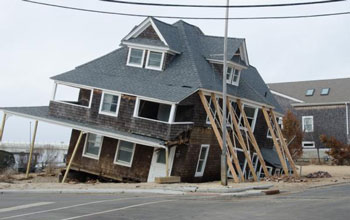Protecting America's vulnerable and vital coastal zones: NSF announces awards to study coastal hazards and find new solutions

NSF has funded new awards to protect U.S. coastal systems, crucial to regional and national economies.
Credit: FEMA
To help coastal communities become more resilient in the face of mounting environmental pressures, the U.S. National Science Foundation's Coastlines and People Program has awarded more than $29 million in new grants in fiscal year 2021. Understanding the hazards coastal areas face requires input and insights from many groups. CoPe funding is bringing together geoscientists, social scientists, biologists and engineers to work on complex coastal problems.
"These projects are unique, community-built and embody the CoPe goals of broadening participation in science and fostering societally relevant coastal research," says NSF CoPe program director Amanda Adams.
"The awards address coastal hazards from the Pacific Northwest to the Gulf of Mexico to the mid-Atlantic and engage communities from the densely populated Eastern Seaboard to tribal and rural coastal communities."
The efforts show that fundamental research can benefit society, and how we can all work toward greater safety, better resilience and more sustainable coastlines, Adams says
Coastlines are vital to our nation's economy, security and well-being. Nearly 40% of the country's population lives near a coast. Every year, that number increases. Coastal areas are under threat from extreme weather, sea level rise, coastal flooding, tsunamis, landslides, harmful algal blooms and other natural hazards that can damage housing, businesses, freshwater supplies, the electrical grid and transportation infrastructure.
The new CoPe awards, given to Hubs for Research and Broadening Participation, are for diverse, multi-institution projects that will tackle the hazards and issues coastal areas face. Hubs provide the opportunity for several groups to connect and participate in shaping the research.
The awards take a problem-solving approach to coastal hazards by fostering collaborations with those most vulnerable to the impacts. Many of these communities incorporate groups that historically have not been included in STEM fields. Hubs for Research and Broadening Participation involve stakeholder groups in the design and choice of science questions to investigate to broaden participation, increase stakeholder engagement, and increase the success of coastal hazards research.
Projects focus on coastal issues with widespread applicability. The results will address real-world complexities that can help federal partners, local authorities and coastal communities. At the international level, CoPe is endorsed by the U.N. Decade of Ocean Science for Sustainable Development.
See the list of the CoPe Hubs for Research and Broadening Participation.
Media Contacts
Media Affairs, NSF, (703) 292-7090, media@nsf.gov


